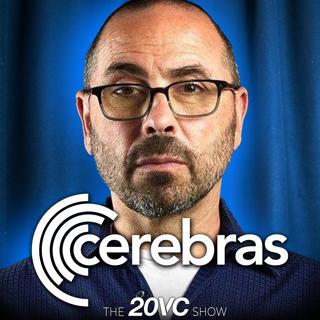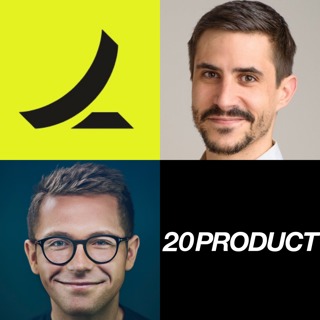
20VC: Ramp's Product Playbook: How To Hire Product Teams, How to Run Sprints, How to Increase Product Velocity, When and How to Go Multi-Product with Geoff Charles, VP Product @ Ramp
Geoff Charles is the VP of Product at Ramp, leading the product management, operations, and support teams. Prior to Ramp, Geoff helped spin off Mission Lane and scale credit products to millions of consumers. He started his career advising Fortune 100 financial services companies. In Today's Episode with Geoff Charles We Discuss: 1. How to Become a Product Leader: How did Geoff make his way into the world of product? What are the single most important skills for product people to learn early? What are the biggest mistakes that product people make early in their career? 2. When and Who to Hire for the First Product Team: When is the right time to hire your first product people outside of founding team? Why are the best product teams in the early days professional services teams? What is more important; the person has stage or sector experience, when joining? Should you hire senior product people or junior product people as the first hires? 3. How to Increase Velocity Using Sprints: How does Geoff and Ramp use two-week sprints to have insane product velocity? How are they structured? How are goals set? Who is included? What makes a good vs a bad sprint? How is accountability tied to sprints? When do two-week sprints no longer become possible? What happens then? 4. Going Multi-Product, Will Incumbents Kill You and Product Re-Usability: When is the right time to add a second product? What are the biggest mistakes companies make when going multi-product? Why is it unlikely that an incumbent is the one to kill you? What competitor should worry you? What does Geoff mean when he speaks of "product re-usability"? Why is it crucial to velocity?
6 Dec 202352min
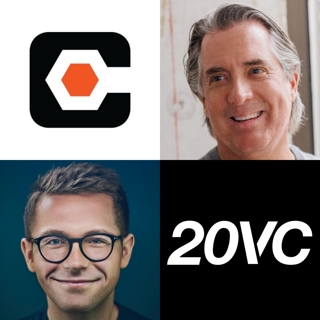
20VC: From Construction Worker to Billionaire CEO; The 21-Year Epic Journey of Procore to an $8.6BN Company, Advice from Tobi at Shopify on Being a Great CEO & Why The Idea of "Becoming an Entrepreneur" is BS with Tooey Courtemanche
Tooey Courtemanche, Jr. is the Founder, CEO, President, and Chairman of the Board of Procore. He founded Procore in 2002 with a mission to connect everyone in construction on a global platform. After 13 years of business, the company had just $9.6M in revenue, 8 years after that they have over $890M in revenue. Under his leadership, Procore has grown to become a leading global provider of construction management software, connecting over 2 million users across 150+ countries. Today Procore trades on the New York Stock Exchange under the ticker PCOR. Huge thanks to Brian @ Bessemer and Will @ Iconiq for some amazing question suggestions today. In Today's Episode with Tooey Courtemanche: 1. The Founding of a $8.5BN Company: How did Tooey's wife, Hilary and their house-building lead to the idea for Procore? What does Tooey know now that he wishes he had known when he started? Did Tooey always know he would be a success? What was the moment of most doubt? 2. The 13-Year Journey to $9.6M in Revenue: Why did it take so long to hit the $10M revenue mark? What changed in 2015? What is Tooey's biggest advice to founders and investors who face market timing risk? Why was Tooey laughed out of VC offices in 2008? What are his biggest pieces of advice to founders raising from VCs today? How does Tooey advise founders on the balance between vision and sticking to a mission vs realising when it is not working and giving up? 3. The Art of Great CEOship: What advice did Tobi @ Shopify give Tooey on being a great CEO? How did it impact his approach? What are the biggest differences between the reality of being a CEO and the Instagram version? What have been Tooey's biggest lessons on hiring? Why does hiring smart, ambitious but not humble people never work? Why does Tooey believe the idea of "becoming an entrepreneur" to be BS? 4. Parenting, Money and Marriage: Why does Tooey believe great parenting is like great CEOship? How does one bring up children to be ambitious and humble in a very privileged upbringing? What are the secrets to being there as a husband while also being a rockstar CEO? How does Tooey reflect on his own relationship to money and wealth today?
4 Dec 20231h 14min
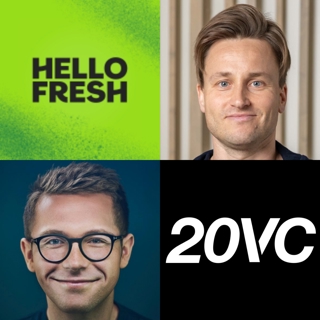
20VC: HelloFresh CEO on Why When You Raise VC You Only Have Two Options, Why Your IPO Price is Irrelevant, Why Timing is So Important in Going Public & Why D2C is Not Dead with Dominik Richter
Dominik Richter is the Founder & CEO @ HelloFresh, one of the largest direct-to-consumer businesses of the last decade and the #1 recipe box delivery service. Fun fact, two of the three biggest cooking facilities in North America are HelloFresh facilities with the third being Disney World Orlando. Dominik has made over 40 angel investments in the EU and the US. In Today's Episode with Dominik Richter We Discuss: 1. The Founding of One of the Largest D2C Companies: How did Diminik's dreams of being a footballer translate to founding HelloFresh? What does he know now that he wishes he had known when he started? Why does Dominik respect the brands that large banks have built? 2. To Raise or Not to Raise: Why does Dominik believe when you raise VC, you either have to sell or go public? What are the single biggest differences between raising in the US vs Europe? What are Dominik's biggest pieces of advice to founders raising today? Why does Dominik believe so many of the D2C companies should not have raised venture funding? 3. The IPO: When, How and Why: Why did Dominik decide to IPO the business so early? Why does Dominik believe that the first-day trading price is irrelevant? Why does Dominik believe that timing is so important when going public? What are the biggest pros and cons of being public? 4. The Rise and Fall of D2C: D2C has been crushed lately, why? Is this the end of D2C as a category? Is D2C an investable category for VC? HelloFresh is one of the biggest and $2.5BN market cap? What have been the best and worst resource allocations Dominik has made? Do recessions help or hurt recipe box businesses?
1 Dec 202355min
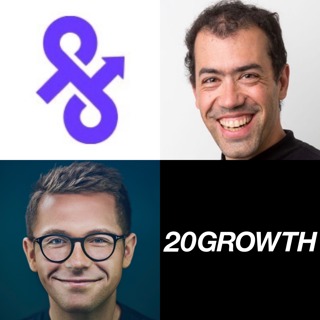
20Growth: The Golden Rule to $100M in ARR, Why CAC to LTV is BS Early On, Why Your First Growth Hire Should Be a Former Founder & How Ramp Does 200 Growth Experiments Per Quarter with Guillaume Cabane
Guillaume Cabane is a growth advisor to high-growth SaaS Startups, including Ramp, Spot, Airbyte, G2, Gorgias, Metadata, Madkudu, and others. Guillaume held VP of Growth roles at Drift, Segment, and other successful startups, where he helped them grow from ~50 to 300. Prior, Guillaume spent 6 years at Apple. In Today's Episode with Guillaume Cabane We Discuss: 1. Entry into Growth: How did Guillaume make his way into the world of growth? What are 1-2 of his biggest lessons from him time at Segment where he 4x revenue? What does Guillaume know now that he wishes he had known when he entered growth? 2. Enterprise vs SMB & CAC/LTV: Why does Guillaume think it is harder to go enterprise down than SMB up? What are the biggest mistakes companies make when scaling into enterprise? What are the biggest mistakes startups make with product-led-growth motions? Why does Guillaume believe it is impossible to analyse CAC/LTV in early companies? 3. Activation, Engagement and KPI Setting: What are the biggest mistakes companies and teams make in activation? What can growth and marketing teams do to guarantee engagement in prospects? Why are all KPIs not tied to revenue BS? 4. Hiring the Growth Team: What are the core characteristics of great growth hires? How quickly does it become apparent when you have made a bad growth hire? Why do founders make the best profiles when hiring your first growth hire? What are the biggest mistakes Guillaume has made when hiring for growth? 5. Why Growth is Like Venture: What is the secret to building a great growth portfolio? Why is it impossible to scale to $50M ARR with only one good channel? What is the right way to spread resources across channels? When is the right time to add new channels and diversify?
29 Nov 20231h 4min
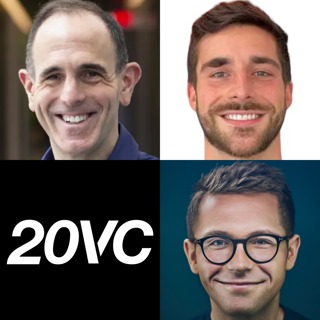
20VC: Keith Rabois and Mike Shebat on Creating an Olympian Mindset to Work Ethic, Why First-Time Founders are Better Than Serial Entrepreneurs, Why Remote Work Does Not Work, Why the Best Founders Always Start in their Teens & Why Companies are Cults?
Keith Rabois is a General Partner @ Founders Fund, one of the world's best venture funds with a portfolio including the likes of Facebook, SpaceX, Anduril, Tesla and many more. For the last 23 years straight, Keith has either invested in or founded a $BN company. Keith is also the Co-Founder and CEO @ Openstore, the company that will buy or run your Shopify business. Mike Shebat is the Founder and CEO @ Traba, the company providing industrial staffing when and where you need it. To date, Mike has raised $49M with Traba from some of the best including Founders Fund, General Catalyst and Khosla Ventures. In Today's Episode We Discuss: 1. What it Takes to Build a Great: Why does Mike expect everyone to work in office 12 hours per day, 4 days per week? At what point does an extra hour of work not lead to more output? What are the expectations in terms of emails, out of office, the weekends? Keith, from the 23 BN companies you have worked with, is this insane work ethic aligned to all of them? Which had it? What did not? What core components of PayPal's work ethic made it so strong? What does Keith mean when he says Linkedin could and should have been 5x bigger? 2. The Hiring Process for the Swat Team: What does the hiring process look like for this type of work environment? What are the signs that someone is really aligned to it vs faking it for the interview process? What have been Keith's biggest lessons on both compensation and title in the hiring process? Why does Keith believe that culture is like concrete? What are the biggest mistakes he has made on culture and what would he have done differently? 3. First-Time Founders, Innate Entrepreneurs & Europe's Failing: Does Keith agree the best founders always show signs of early entrepreneurship in their teens? Why does Keith prefer first-time founders to serial entrepreneurs? Why are they better? Why does Keith believe that Europe has not created a $100BN company since 1990? 4. Remote Work, Network Effects and Baseball: Why does Keith believe being great in venture is like baseball? Why does Keith and Founders Fund not invest in remote teams? How does he explain Gitlab? Why does Keith believe Airbnb has the best network effect he has ever seen?
27 Nov 202357min

20VC: AI's Biggest Questions: The Commoditisation of LLMs, Open vs Closed: Who Wins, Model Size vs Data Quality, Why Google are Vulnerable and Apple are the Dark Horse
Des Traynor is a Co-Founder of Intercom, and has built and led many teams within the company, including Product, Marketing, and Customer Support. Yann LeCun is VP & Chief AI Scientist at Meta and Silver Professor at NYU affiliated with the Courant Institute of Mathematical Sciences & the Center for Data Science. He was the founding Director of FAIR and of the NYU Center for Data Science. Emad Mostaque is the Co-Founder and CEO @ StabilityAI, the parent company of Stable Diffusion. Stability are building the foundation to activate humanity's potential. Jeff Seibert is the Founder & CEO @ Digits, building the future of AI-powered accounting. Digits have raised funding from the likes of Peter Fenton @ Benchmark and 20VC. Tomasz Tunguz is the Founder and General Partner @ Theory Ventures, just announced last week, Theory is a $230M fund that invests $1-25m in early-stage companies that leverage technology discontinuities into go-to-market advantages. Douwe Kiela is the CEO of Contextual AI, building the contextual language model to power the future of businesses. Cris Valenzuela is the CEO and co-founder of Runway, the company that trains and builds generative AI models for content creation. Richard Socher is the founder and CEO of You.com. Richard previously served as the Chief Scientist and EVP at Salesforce. Before that, Richard was the CEO/CTO of AI startup MetaMind, acquired by Salesforce in 2016. In Today's Episode We Discuss: Foundational Models: Analysis Will foundational models become commoditized? Who are the major players? What are their different strengths? Who will win? Who will lose? How important is the size of the model vs the quality of the data? 2. Open vs Closed: What are the biggest pros and cons of an open ecosystem for LLMs? Why is it naive to think that open-source LLMs will prevail? What will determine which method wins? 3. An Analysis of the Incumbents: Why is Google the most vulnerable? What can they do to regain ground? Why is Apple the sleeping giant? How could they win the next wave of AI? What should Amazon do today to compete with Microsoft? 4. The Future: Doom and Gloom? Why is it ridiculous to assume AI systems want to dominate? Why will AI create a renaissance of creativity and human freedom? What role should regulation play in the advancement and progression of AI?
24 Nov 202333min
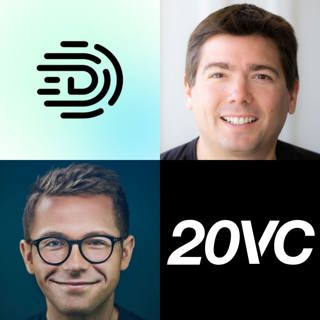
20VC: Why OpenAI Will Become an Infrastructure Play, Why Apple Will Win in an AI World, Why Google is the Most Vulnerable Incumbent, Will LLMs Be Commoditised, Which Startups Are Thin vs Thick Wrappers on Top of LLMs with Jeff Seibert, Founder @ Digits
Jeff Seibert is the Founder & CEO @ Digits, building the future of AI-powered accounting. Digits have raised funding from the likes of Peter Fenton @ Benchmark and 20VC. Jeff previously served as Twitter's Head of Consumer Product, a position he came to following the acquisition of his prior company, Crashlytics. Today, Crashlytics is the de-facto mobile crash reporting solution for iOS and Android and runs on over 6 Billion monthly active smartphones worldwide. In Today's Episode with Jeff Seibert We Discuss: 1. The Art of the Pivot: What are Jeff's biggest pieces of advice to founders pivoting? How do you know when you have enough data to make the decision to pivot? What are the single biggest mistakes founders make when pivoting? 2. AI: Who Wins and Who Loses: Why does Jeff believe that OpenAI will transition into an infrastructure play? What are the most significant challenges OpenAI will face moving forward? Why does Jeff believe that Apple are best positioned to win in an AI world? Why does Jeff believe that Google are the most vulnerable incumbent? What would Jeff do if he was CEO of Google? 3. LLMs: What Happens Now: Will we see the commoditization of LLMs? What are the biggest misconceptions people have on training and fine-tuning LLMs? Will we see LLMs increasingly specialise to vertical-specific models or will they remain horizontal? What is the difference between a thick and a thin wrapper when building on top of LLMs? 4. Angel Portfolio in Review: How many angel checks has Jeff written? How many failed? How many home runs? Does Jeff believe that company valuations are being kept artificially high? How did Jeff make 200x selling through the secondary market for a now failing company? What are Jeff's three biggest pieces of advice for angels today?
22 Nov 202358min
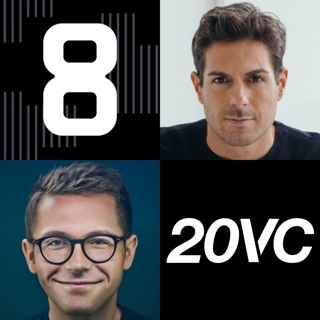
20VC: The Ultimate Hiring Playbook: Five Questions to Ask Every New Hire | What Makes Truly Great Leaders and How They Give Feedback | Do VCs Really Add Value; Lessons from Hard Fundraises with Matteo Franceschetti, Co-Founder @ Eight Sleep
Matteo Franceschetti is the Co-Founder and CEO @ Eight Sleep, a company dedicated to fueling human potential through optimal sleep. To date, Matteo has raised over $160M for the business from the likes of Founders Fund, Ryan Petersen, Naval Ravikant, Kevin Hart, AROD and many more. In Todays Episode with Matteo Franceschetti We Discuss: 1. Why Did Sleep Need "Solving": Why did Matteo decide he wanted to spend decades of his life-solving sleep? If Matteo has known how hard it was going to be, would he do it again? What does Matteo know now that he wishes he had known at the start of the journey? 2. Hiring the Best Team: What is Matteo's playbook for hiring? What are the five questions that Matteo asks in every interview? What are big red flags? What are strong signals of great talent? If people have been let go in a RIFF, is that a concern? How does Matteo construct hiring panels? What vote count is enough for an approved hire? What are Matteo's biggest lessons on title and pay a new hire receives? What are some of Matteo's biggest lessons when it comes to firing people? 3. Funding the Business: What was the hardest round to raise? Why? Are investors justified in their skepticism of hardware? What are the single biggest pieces of advice Matteo would give to founders on raising? How impactful has it been having Keith Rabois and Founders Fund as an investor? Do VCs really add value? 4. Mastering Health, Sleep and Nutrition: How does your diet impact the quality of sleep you have? How does exercise and the time of exercise impact your sleep? What are some common rules on sleep that are BS and myths? What are some of the most non-obvious truths about getting great sleep?
20 Nov 20231h 39min
